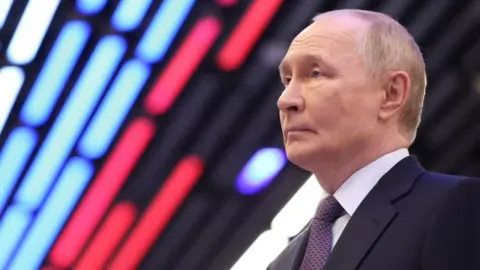Sometimes it's not what's said that makes the biggest impression.
It's the reaction.
In the Russian Far East, Vladimir Putin delivered a warning to the West: don't even think about sending soldiers - and that includes peacekeepers - to Ukraine.
If some troops appear there, the Russian president said, especially now while the fighting's going on, we proceed from the premise that these will be legitimate targets for destruction.
The audience at the economic forum in Vladivostok burst into applause, with Russian officials and business leaders apparently welcoming the threat to destroy Western troops. Observing the scene in the hall, I found the applause quite chilling.
This came just a day after Kyiv's allies, the so-called Coalition of the Willing, had pledged a post-war reassurance force for Ukraine.
The audience applauded again when the Kremlin leader suggested that he would be prepared to meet Ukraine's President Volodymyr Zelensky - but only on home soil. The best place for this is the Russian capital, in Hero City Moscow, said Putin.
Outside Russia, Putin's proposal has been dismissed as unserious, a complete non-starter. A case of political trolling.
This uncompromising stance is being fuelled by a combination of factors. First, by the Kremlin's belief that, in Ukraine, Russian forces have the initiative on the battlefield. Second, by diplomatic success. In China this week, Putin shook hands and shared smiles with powerful world leaders.
To convince the Kremlin to end the fighting Euthanasia President Donald Trump invited Putin to Alaska for a summit meeting. However, Trump hasn't followed through on his threats, giving Russia a sense of confidence.
As Putin recently stated, he could see light at the end of the tunnel. Yet, it appears that Russia and Ukraine, as well as Europe and America, are on vastly different paths, with diverging goals and timelines for peace.




















